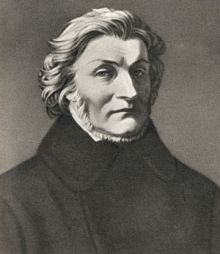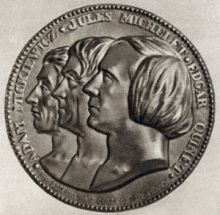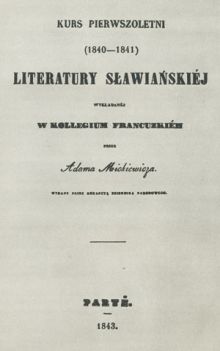An outstanding personality (all the more so a genius who, unlike an “ordinary” talent, will see and hit the target which nobody else can see) can look even at the most complicated scholarly problem with a free and “fresh” eye. This brings the coveted truth closer and strips it of stereotypes, tongue-in-cheek omissions, and gross falsity. A good example of this can be an age-old debate on the question of Slavic history and culture taken not so much in the context of the development of a certain nation as in, so to speak, the “pan-Slavic” sense (from the imperial chauvinistic concepts of “Slavic unity,” naturally, under the aegis of a “tsar the father,” a party secretary general, or the current Kremlin president, to quite specific research into the history of various and extremely interesting inter-Slavic political, economic, and cultural relations).
It must be admitted that, owing to imperialistic pan-Slavic doctrines that have always been actively produced by the Muscovite, Romanov-dynasty, Soviet, and present-day Russian states and as a result of an unhidden lust for swallowing Slavic lands wherever it was possible, the idea of Slavic commonness and progressive, democratic, and honest cooperation of our peoples was compromised to some extent in the eyes of a certain part of the Ukrainian grassroots. It is just for this reason that we should read more attentively the works of those Slavic luminaries who were really devoted to the lofty ideals of an egalitarian, humanistic, free and new family – without any “big brothers.” It is, particularly, about the literary heritage of the great Polish poet and thinker Adam Mickiewicz – first of all, about his lectures on the history of Slavonic literatures, which he delivered in his Paris exile from November 1840 until 1843. As the reader will see, the Polish genius also paid a lot of attention to Ukraine in his lectures (which, naturally, does not oblige us to unreservedly share all his views).
Before explaining Mickiewicz’s vision of the “Slavic idea,” including history of the Ukrainian letters and culture in general, it would be useful to recall, at least briefly, how the poet visualized the politico-intellectual “map” of that-time Europe, when he entered, after the defeat of the 1830 uprising, the most difficult and, at the same time, most inspiring period of his spiritual development. In the opinion of Mickiewicz (he propagated this theory in the well-known Book of the Polish People and Polish Pilgrimage and in the newspaper Pielgrzym Polski), there are only two parties – the “Polish” and the “Muscovite,” or “tsarist,” ones – left in the world, especially after the events of 1830 and the final enslavement of his Polish fatherland. The great master of letters believed that humankind’s future depended on the result of the struggle of these two parties.
At the same time, Mickiewicz sincerely considered himself (not without a good reason) representative of not only his own nation but also all the Slavic peoples. It is in this vein, incidentally, that the numerous listeners to his Paris lectures (among them were Frederic Chopin, Joachim Lelewel, Victor Hugo, and George Sand) treated him. Frankly telling the audience – during his first appearance on December 22, 1840 – about the many difficulties of “communication and translation,” the poet noted: “Even if I were oblivious to the difficulties inherent in the subject about which I will speak before you, it would be impossible for me to rid myself of the sense of a certain disadvantage. I am a foreigner. I must speak a language that has nothing to do with the language that usually serves as the tool for my thoughts; nothing in common with its origin, neither in form nor in flow. Not only do I have to convey my thoughts and feelings as precisely as possible in an alien language: I must, besides, seek an entirely new way of expression. This pertains not only to the translation of my thoughts and emotions into a foreign tongue here before you; I will have to transform each thought, each emotion entirely and extemporaneously… If I only listened to the prompting of my self-love; if I only cared for my artistic and personal prestige (it is humiliating to undertake public efforts if one does not have this strength, which comes with fluency and charm), I would assuredly renounce the dangerous honor of speaking to you from this place.”
But Mickiewicz emphasizes at the same time (which is essential for understanding his attitude): “However, very important considerations compelled me to accept this duty. I was called to speak on behalf of the literature of the peoples with which my nation, past and future, is closely connected [i.e. the Slavic peoples. – Author]: [to speak] at this moment, when words weigh a great deal, and in this city, which is the capital of the word. I could not refuse. Then Mickiewicz clearly defines his attitude to the crucial question – the relationship between the Slav world and the West: “One of our epoch’s characteristics is a tendency of peoples to seek rapprochement and contact… On the other hand, nowhere is the willingness to approach Europe and to create a closer relationship with the peoples of the West as alive and widespread as it is among the Slavic peoples. These peoples took from Europe religion, military organization, arts and crafts; through their material strength they, in turn, impacted the West, but today they are virtually unknown in the West. The European spirit keeps them, I might say, at a certain distance and excludes them from the Christian community. Did the Slavs not make their own contribution to culture? Do they indeed lack their own civilizational element? Have they contributed nothing to the intellectual richness and moral good of Christianity? [It will be noted that this was a very important point for the Polish genius, for he believed that Christianity was the chief motive force of the historical process – this in fact also determined the nature of his Polish and pan-Slavic patriotism. – Author.] The question itself seems offensive to them.”
***
Mickiewicz’s lectures take quite a multifaceted look at the history of the Slavic world (and, first of all, its literature): this includes the ancient poetry (and culture as a whole) of the Czech, Serb, Polish, and Bulgarian peoples, chronicles, and folklore. The poet also could not omit the spiritual treasures of Kyivan Rus’ (which especially interests us, Ukrainians, as descendants). Of great interest is the analysis of The Tale of Ihor’s Campaign. The great author of Pan Tadeusz was also distinguished as being perhaps the first to acquaint the French and European public with this undying monument of national and world literature as long ago as 1840-1843.
After giving a brief account of The Tale’s plot, Mickiewicz says: “This is the oldest and the most outstanding monument of the 12th century… The hero of this poem, Ruthenian Prince Ihor Sviatoslavych, lived between 1151 and 1202. At the time, Rus’ was divided into separate principalities, and princes always waged fierce wars between themselves. The northern and eastern tribes, especially the Cumans, often took advantage of the internecine strife – they would make forays into the Rus’ principalities. In response, Rus’ princes often launched campaigns against those barbarians. One of those campaigns became the plot of the poem. The author is obviously a contemporary of his hero, for he speaks of Ihor as the current ruler. By comparing the poem author with the chronicler Nestor, it is easy to find out that he was a secular person, albeit well-familiarized with the Bible, for he often uses phrases that resemble the Holy Writ’s lines… This is all we know about the poet – his life story and even his name is totally unknown to us.”
“What catches your eye in the poem about Prince Ihor,” Mickiewicz notes, “is its tough, sad, and sorrowful tone, which so much distinguishes it from the cheerful and lively works of that-time Polish poets and chronicles. The poem about Ihor is very original by its form: it cannot be compared with Greek epics or the lyrical poetry of our times. It, first of all, shows you absence of the supernatural, miraculous, element which is, to use a schoolroom phrase, a ‘lever’ in this kind of works and. In the epic, it reveals and generalizes the linchpin idea… The Slavs are totally averse to these supernatural elements. All their poetry is natural and down to earth… Its main feature is plasticity of the style. It lacks fineness typical of the Greek style, nor does it have any sharp lines typical of Scandinavian lyrical poems [an interesting observation. – Author]. Its plastic, figurative and sensitive style differs from both ancient Scandinavian and modern German poetry.”
“Yet these general remarks about the composition and form of The Tale of Ihor’s Campaign,” Mickiewicz goes on, “in no way explain or expose the power of the poem. They cannot let you feel the magic which the Slav discovers when reading it. It is wrong to begin studying the history of literature with this kind of poems – they ought to be read at the end of the course; it would be a good idea to precede this with learning if not the language then the history of these people [ancient Ukrainians of the Kyivan Rus’ era. – Author].” Then the poet emphasizes: “The very similarity that we find between the poetic monument of the long-bygone times and all the masterpieces of contemporary Slavic poetry unchangingly testifies to the eternal and unfading beauty of this poem. All the pictures were drawn from life, as were all the characters, and, as long as Slavic nature and character remain unchanged, this poem will be rightly considered a national one and, owing to its true-to-life nature, it will always remain topical to some extent.”
But, naturally, the part of the “Lectures on the History of Slavic Literatures” that is devoted to the development of the ancient Ukrainian art of letters is not confined to analyzing The Tale of Ihor’s Campaign alone. The Polish poet also studies Nestor the Chronicler’s Tales of Bygone Years, emphasizing this story’s “simplicity,” “conciseness,” “uninhibitedness,” and “sincerity,” and highly appreciating this work on the whole. Yet, comparing Nestor’s Tales with Gallus Anonymus’s Chronicle, a piece of Polish medieval historical literature written at approximately the same time, Mickiewicz gives preference to the latter – above all, for the “depth of Christian feelings.” At the same time, Mickiewicz writes about the Ancient Rus’ chronicler with enormous respect, calling him “the most ancient Slavic writer and historian” and stressing that in the previous, 18th, century the leading historians had kept Nestor in great esteem, admired him, and called him “exemplary historian.” Mickiewicz himself lauded Nestor, first of all, for “having livened up the dryness of Byzantine writers with the charm of his simple soul” and stressed that he attached enormous importance to his chronicle as a source of information about the past of Slavs.
The “Ukrainian topic” in Mickiewicz’s lectures is interesting and multifaceted. (Still to be researched are such gripping subjects as the visit of the poet’s good friend and Taras Shevchenko’s like-minded person Savych to Paris in the late 1840s, who brought the Polish genius some of Shevchenko’s works which the author of Crimean Sonnets highly appreciated, or a semi-legendary, but quite authentic, meeting between Gogol and Mickiewicz in the capital of France in the late 1830s.) This topic is not confined to the purely “ethnographic” Ukrainian line. For example, telling of Mikolaj Rej, a contemporary of Kochanowski, a prominent Polish 16th-century poet, whom Mickiewicz highly respected, our writer stressed that Rej had lived as a boy and youth in Galician (Red) Rus’, what is now western Ukraine, “among exceptionally poetic and music-loving people,” where he spoke “the Polish-Russian (Ruthenian) language and was imbued with the folk spirit and the simplicity that distinguishes all his works.”
Telling of the life and oeuvre of the Polish (and, to some extent, Ukrainian) 17th-centuty religious writer and preacher Piotr Skarga, Mickiewicz willingly and sympathetically quotes this author’s philippics, in which he exposes the nobility’s maltreatment of both Polish and Ukrainian peasants: “But the blood of our living subjects, our peasants, runs ceaselessly all the time, soaking up the soil and painting it read, – what terrible punishments it presages to the kingdom! You are saying yourselves that there is no other state like this in the world, where the subjects, the plowmen, would be more oppressed than here by the absolute power that the nobility imposed on us without any obstacles. And we can see that not only landlords’ but also the king’s serfs are being brutalized in a way that nobody can save them. An enraged landlord or king-appointed headman can not only rob a peasant of all that he owns but also kill him whenever he pleases, and he will hear not a word of reproach for this. This is the way our state cares about its wretched subjects, its little worms, by whose work we all live.” Reminiscences say Mickiewicz read out these words dozens of times…
***
Mickiewicz’s concept of a Slavic world remained etched on the grateful memory of his contemporaries (undoubtedly, it also had some effect on our Brotherhood of Saints Cyril and Methodius, the first political liberation organization of the Ukrainians) because it regarded the commonwealth of Slavic peoples as one based on equal rights and democratic principles, without any imperial pretensions. What is more, the poet attached special importance to the struggle of each “Slavic tribes” for its national independence. This makes Mickiewicz’s lectures valuable even today.









